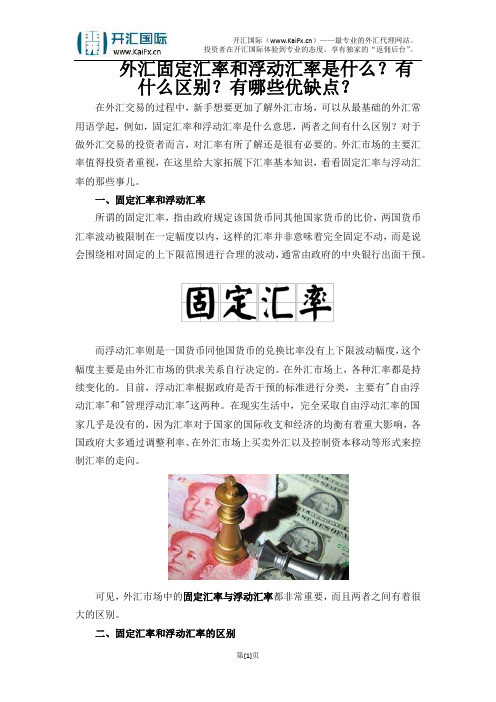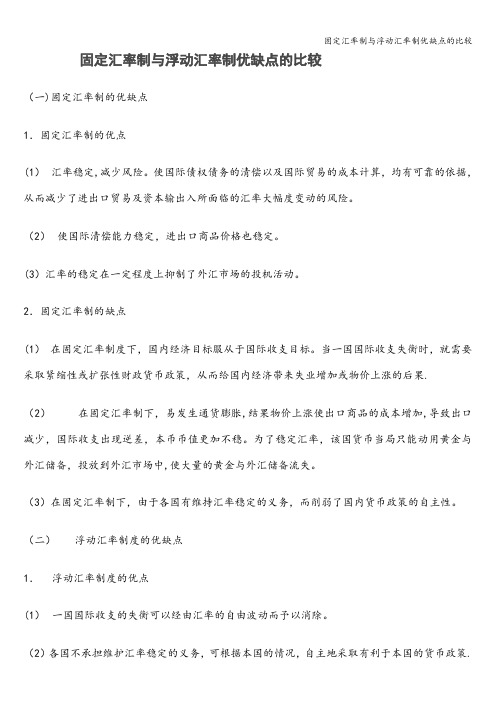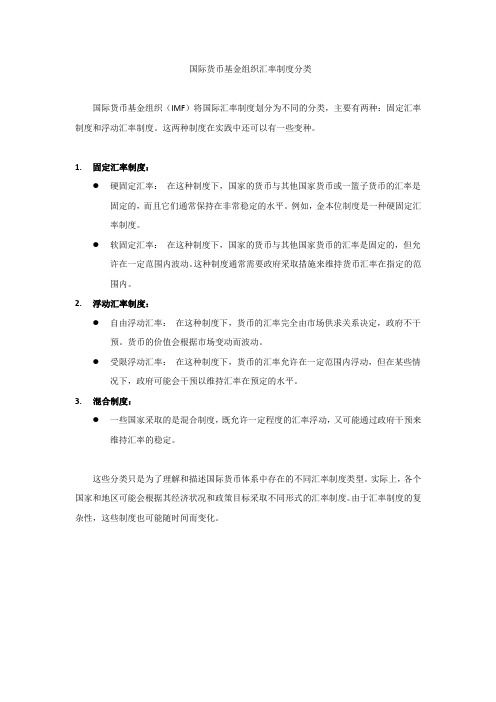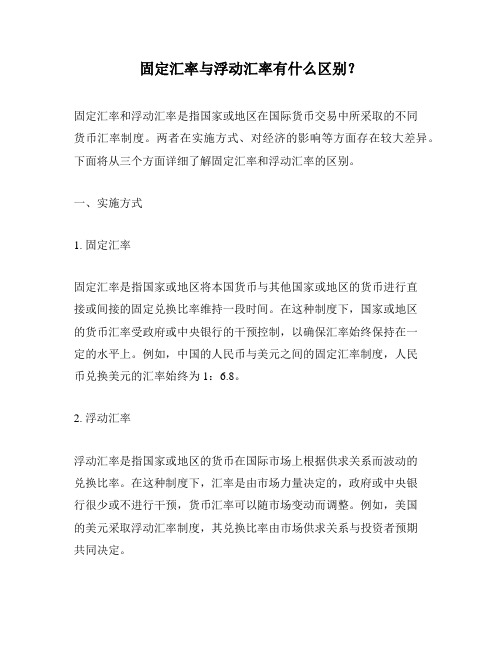3固定汇率与浮动汇率比较
浮动汇率和固定汇率的区别

The People’s Bank of China (PBC) operates a “managed” exchange rate. Explain what this means.浮动汇率和固定汇率的区别:1、两者的概念不同。
(1)浮动汇率指一国货币同他国货币的兑换比率没有上下限波动幅度,而由外汇市场的供求关系自行决定。
(2)固定汇率指一国货币同另一国货币的兑换比率基本固定的汇率。
2、两者的分类不同(1)浮动汇率制按照国家是否干预外汇市场,可分为自由浮动和管理浮动(2)固定汇率没有分类3、两者的特点不同(1)浮动方式来看,浮动汇率又可分为单独浮动和联合浮动。
单独浮动是一国货币的汇率自行浮动,其汇率变动与其他货币的汇率无关。
联合浮动是在若干国家实行某种经济联合的条件下,对汇率波动所做的内外有别的安排。
对内,参加经济联合的几个国家为它们的货币兑换规定中心汇率,彼此间货币汇率的浮动不能超过一定的范围;超过一定范围,参加联合浮动的有关国家的中央银行要进行干预。
对外,这几个国家的汇率则统一浮动。
除上述两种浮动方式外,还有一种钉住浮动,指有些国家由于历史上的原因或其进出口贸易结构的需要,将本国货币的汇率与某一种或几种关键货币挂钩,然后随该货币汇率浮动。
(2)固定汇率有优缺点优点:A、有利于经济稳定发展B、有利于国际贸易、国际信贷和国际投资的经济主体进行成本利润的核算,避免了汇率波动风险。
缺点:A、汇率基本不能发挥调节国际收支的经济杠杆作用B、为维护固定汇率制将破坏内部经济平衡。
比如一国国际收支逆差时,本币汇率将下跌,成为软币,为不使本币贬值,就需要采取紧缩性货币政策或财政政策,但这种会使国内经济增长受到抑制、失业增加。
C、引起国际汇率制度的动荡和混乱。
东南亚货币金融危机就是一例。
除此之外,自2005年7月21日起,我国开始实行以市场供求为基础、参考一篮子货币进行调节、有管理的浮动汇率制度。
实行以市场供求为基础、参考一篮子货币进行调节、有管理的浮动汇率制度。
外汇固定汇率和浮动汇率是什么?有什么区别?有哪些优缺点?

外汇固定汇率和浮动汇率是什么?有什么区别?有哪些优缺点?在外汇交易的过程中,新手想要更加了解外汇市场,可以从最基础的外汇常用语学起,例如,固定汇率和浮动汇率是什么意思,两者之间有什么区别?对于做外汇交易的投资者而言,对汇率有所了解还是很有必要的。
外汇市场的主要汇率值得投资者重视,在这里给大家拓展下汇率基本知识,看看固定汇率与浮动汇率的那些事儿。
一、固定汇率和浮动汇率所谓的固定汇率,指由政府规定该国货币同其他国家货币的比价,两国货币汇率波动被限制在一定幅度以内,这样的汇率并非意味着完全固定不动,而是说会围绕相对固定的上下限范围进行合理的波动,通常由政府的中央银行出面干预。
而浮动汇率则是一国货币同他国货币的兑换比率没有上下限波动幅度,这个幅度主要是由外汇市场的供求关系自行决定的。
在外汇市场上,各种汇率都是持续变化的。
目前,浮动汇率根据政府是否干预的标准进行分类,主要有"自由浮动汇率"和"管理浮动汇率"这两种。
在现实生活中,完全采取自由浮动汇率的国家几乎是没有的,因为汇率对于国家的国际收支和经济的均衡有着重大影响,各国政府大多通过调整利率、在外汇市场上买卖外汇以及控制资本移动等形式来控制汇率的走向。
可见,外汇市场中的固定汇率与浮动汇率都非常重要,而且两者之间有着很大的区别。
二、固定汇率和浮动汇率的区别固定汇率指一国货币同另一国货币的兑换比率基本固定的汇率。
在19世纪初到20世纪30年代的金本位制时期、第二次世界大战后到70年代初以美元为中心的国际货币体系,都实行固定汇率制。
固定汇率并非汇率完全固定不动,而是围绕一个相对固定的平价的上下限范围波动。
浮动汇率指一国货币同他国货币的兑换比率没有上下限波动幅度,而由外汇市场的供求关系自行决定。
1971年8月15日,美国实行新经济政策,任由美元汇率自由浮动,到1973年,各国普遍实行浮动汇率制度。
也正是从那时开始,外汇市场随着各种汇率的不停的浮动而不断发展。
固定汇率与浮动汇率优缺点之比较

汇率制度概述
•
汇率制度,是指一国货币当局对本
国汇率水平的确定、汇率变动方式等问题
所作的一系列安排或规定。不同的汇率制
度意味着政府在实现内外均衡目标的过程
中需要遵循不同的规则,同时,汇率的特
定水平及其调整对本国的经济也有着重大
影响。
固定汇率与浮动汇率优 缺点之比较
固定与浮动的含义
• 固定汇率制度是货币当局把本国货币对其他货币的汇率加 以基本固定,波动幅度限制在一定的、很小的范围之内。 这种制度下的汇率是在货币当局调控之下,在法定幅度内 进行波动,因而具有相对稳定性。
货膨胀预期的稳定。
缺陷: (1)容易导致本币币值高估,削弱本地出口商品竞争力,引起难以维系的
长期经常项目收支失衡; (2)同时,僵化的汇率安排可能被认为是暗含的汇率担保,从而鼓励短期
资本流入和没有套期保值的对外借债,损害本地金融体系的健康。在 固定汇率制度下,一国必须要么牺牲本国货币政策的独立性,要么限 制资本的自由流动,否则易引发货币和金融危机。 如1992~1993年的欧洲汇率机制危机、1994年的墨西哥比索危机、 1997年的亚洲金融危机、1998年的俄罗斯卢布危机。这些发生危机 的国家都是采用了固定汇率制度,同时又不同程度地放宽了对资本项 目的管制。
• 浮动汇率制度一般指自由浮动汇率制度,是相对于固定汇 率制而言的,是指一个国家不规定本国货币与外国货币的 汇率的上下波动幅度,也不承担维持汇率波动界限的义务, 而听任汇率随外汇市场供求的变化自由浮动。在这一制度 下,外汇完全成为国际金融市场上一种特殊商品,汇率成 为买卖这种商品的格。
资本流动与汇率制度
解释:在固定汇率制和资本可自由流动下, 货币政策为何失效?
蒙代尔-弗莱明模型
固定汇率制与浮动汇率制优缺点的比较

固定汇率制与浮动汇率制优缺点的比较(一)固定汇率制的优缺点1.固定汇率制的优点(1)汇率稳定,减少风险。
使国际债权债务的清偿以及国际贸易的成本计算,均有可靠的依据,从而减少了进出口贸易及资本输出入所面临的汇率大幅度变动的风险。
(2)使国际清偿能力稳定,进出口商品价格也稳定。
(3)汇率的稳定在一定程度上抑制了外汇市场的投机活动。
2.固定汇率制的缺点(1)在固定汇率制度下,国内经济目标服从于国际收支目标。
当一国国际收支失衡时,就需要采取紧缩性或扩张性财政货币政策,从而给国内经济带来失业增加或物价上涨的后果.(2)在固定汇率制下,易发生通货膨胀,结果物价上涨使出口商品的成本增加,导致出口减少,国际收支出现逆差,本币币值更加不稳。
为了稳定汇率,该国货币当局只能动用黄金与外汇储备,投放到外汇市场中,使大量的黄金与外汇储备流失。
(3)在固定汇率制下,由于各国有维持汇率稳定的义务,而削弱了国内货币政策的自主性。
(二)浮动汇率制度的优缺点1.浮动汇率制度的优点(1)一国国际收支的失衡可以经由汇率的自由波动而予以消除。
(2)各国不承担维护汇率稳定的义务,可根据本国的情况,自主地采取有利于本国的货币政策.(3)可以保证各国货币政策的独立性和有效性,避免国际性通货膨胀的传播。
(4)一国由于无义务维持汇率的稳定,因而就不需像在固定汇率制下那么多的外汇储备,可节约外汇资金。
(5)由于各国的国际收支能够自我调整,因而可避免巨大的国际金融恐慌,在一定程度上保证了外汇市场的稳定.2.浮动汇率制度的缺点(1)由于汇率的不稳定性,增加了国际贸易的风险,加大了成本计算及国际结算的困难.从而阻碍了国际贸易的正常发展。
(2)导致各国的国际清偿能力和商品价格不稳.(3)汇率自由波动未必能隔绝国外经济对本国经济的干扰。
(4)助长了外汇市场上的投机活动.(5)“以邻为壑"的政策盛行。
即各国均以货币贬值为手段,输出本国失业或以他国经济利益为代价扩大本国就业和产出。
固定汇率与浮动汇率之比较

固定汇率与浮动汇率之比较汇率是指不同货币之间的兑换比例,而固定汇率和浮动汇率是国际金融市场中两种常见的汇率制度。
本文将比较这两种汇率制度的优势和劣势,以帮助读者更好地了解它们。
一、固定汇率固定汇率是指国家或地区政府将本币的汇率与某一特定货币或一篮子货币锚定在一起,保持在固定的水平上。
下面是固定汇率的几个特点:1. 稳定性:由于固定汇率限制了货币的波动性,因此它能够提供一定的经济和政治稳定性。
这对于吸引外国投资和促进国际贸易非常有利。
2. 可预测性:企业和个人能够在固定汇率下准确预测未来的兑换率,这减少了外汇风险,使得国际贸易和投资更容易进行。
3. 控制通胀:固定汇率使得国家能够更好地控制通胀率。
当本国货币升值时,进口商品会贵于本国商品,从而抑制通胀;反之,当本国货币贬值时,出口商品会更具竞争力,刺激经济增长。
然而,固定汇率制度也存在一些缺点,这些缺点可能导致经济不稳定:1. 外汇储备需求增加:为了维持固定汇率,国家央行必须持有足够的外汇储备。
这意味着对外汇的需求增加,如果外汇储备不足,可能导致汇率危机。
2. 无法调节外部冲击:固定汇率制度限制了货币的自由流动,这意味着国家无法通过汇率调节来应对外部冲击,如全球金融危机。
3. 调整困难:由于汇率的固定性,国家在面对经济压力时难以对汇率进行即时调整。
这可能导致经济不平衡和外汇市场失去自主性。
二、浮动汇率浮动汇率是指汇率根据市场供求关系自由浮动的汇率制度。
下面是浮动汇率的几个特点:1. 自由市场:在浮动汇率制度下,货币的汇率受市场供求关系的影响,这使得汇率更加灵活和透明,可以更快地对经济冲击做出反应。
2. 无需外汇储备:相比于固定汇率制度,浮动汇率制度下,国家央行无需大量持有外汇储备,降低了外汇风险。
3. 调整机制:浮动汇率能够自动调节经济不平衡,当一个国家的货币超值时,出口会减少,进口会增加,从而实现汇率的自然调整。
然而,浮动汇率制度也有一些弊端:1. 不稳定性:由于浮动汇率受市场因素影响,波动频繁,这可能导致汇率的剧烈波动,增加了企业和个人的外汇风险。
固定汇率制度和浮动汇率制度的优劣比较

固定汇率制度和浮动汇率制度的优劣比较固定汇率制度和浮动汇率制度是两种不同的外汇管理制度。
固定汇率制度是指国家将本国货币与特定货币或一篮子货币维持固定汇率,而浮动汇率制度则是允许汇率在市场供求的影响下自由浮动。
下面将从经济稳定性、贸易均衡、政策独立性、汇率风险和国际经济体系稳定性等方面对两者进行优劣比较。
首先,固定汇率制度有助于提供经济稳定性。
由于固定汇率制度限制了货币对外汇市场的波动,经济中的价格和通胀率相对较为稳定。
这有利于稳定国内消费者和企业的预期,促进投资和经济增长。
此外,固定汇率制度还避免了汇率波动带来的汇兑损失,降低了企业的汇率风险。
然而,固定汇率制度也存在一些劣势。
首先,为了维持固定汇率,央行需要进行大量的外汇干预。
这些外汇干预本身就可能对央行的外汇储备构成一定的负担,而且无法完全避免市场对固定汇率的挑战。
其次,固定汇率制度可能加剧经济周期的波动。
当国内经济面临外部冲击时,如果央行长期坚持固定汇率,可能导致国内的货币政策不得不紧缩,进而对经济增长产生影响。
相比之下,浮动汇率制度具有一定的优势。
首先,浮动汇率制度能够自动平衡贸易。
当经济出现贸易不平衡时,浮动汇率可以通过改变货币相对价值而自动调整贸易平衡。
其次,浮动汇率制度能够提高政策独立性。
国家可以根据经济状况自主调整利率和货币政策,而不受固定汇率制度的制约。
此外,浮动汇率制度也有助于避免央行外汇干预和储备消耗的问题。
然而,浮动汇率制度也具有一些劣势。
首先,汇率的波动可能导致投机行为和大规模资本流动,增加了金融市场的不稳定性。
其次,浮动汇率制度可能使国际贸易出现更多的不确定性。
当汇率剧烈波动时,进出口企业难以准确预测未来的汇率水平,给贸易带来不利影响。
此外,浮动汇率制度也可能加剧国际经济体系中的竞争和贸易摩擦。
综上所述,固定汇率制度和浮动汇率制度都有其优势和劣势。
固定汇率制度有助于提供经济稳定性,但需要进行大量的外汇干预。
浮动汇率制度具有贸易均衡以及政策独立性的优势,但可能增加金融市场不稳定和贸易不确定性。
3固定汇率与浮动汇率比较

the rest of the world. Finally, a floating exchange rate system, because its equilibrating nature, would enable a country to hold a smaller amount of foreign exchange reserves.
2
benefits that may result from a system with stable exchange rates should be compared with the costs due to the constraints that such a system imposes on sovereignty, that is, the ability of countries to act on their own instead of under the instructions of another. Clearly, sovereignty is constrained under irrevocable fixed exchange rate (e.g. countries lose control of monetary policy in their own economy as the interest rate cannot deviate from the world interest rate, unless constraints are imposed on convertibity)
3
Floating Exchange Rate The first supposed advantage of a floating rate was that it would rapidly move to maintain purchasing power parity, thus preventing real exchange rate misalignments, and their consequences for the balance of payments, which were often a feature of the Bretton Woods pegged exchange rate system.A second supposed advantage of a flexible rate system was that it would always move to maintain balance of payments equilibrium and so insulate a country from shocks emanating in
固定汇率制度和浮动汇率制度的优劣比较

固定汇率制度和浮动汇率制度的优劣比较固定汇率制度和浮动汇率制度是两种不同的货币汇率管理机制。
固定汇率制度指的是国家或货币区将本币与其他货币或一篮子货币维持固定汇率的制度,而浮动汇率制度则允许市场决定货币汇率的制度。
两者各自有其优劣,下文将对两者进行比较。
首先,固定汇率制度的优势之一是能够提供稳定性和预测性。
由于固定汇率制度的存在,企业和个人可以准确地预测未来汇率变动,这有助于规划和决策。
此外,固定汇率制度还能够减少不确定性,降低进口和出口商品的价格波动风险,促进国际贸易的发展。
其次,固定汇率制度可以提供防御机制,防止外汇市场的过度波动。
当国家面临外汇市场的剧烈波动和过度波动时,央行可以通过干预外汇市场,购买或销售本币来保持汇率的稳定。
这种干预可以帮助维持国家货币的信誉和稳定,防止市场恶性循环和金融危机的发生。
然而,固定汇率制度也存在一些缺点。
首先,尽管固定汇率制度能够提供稳定性,但它也可能导致死板性和缺乏适应性。
如果固定汇率过于僵化,无法适应国家经济的变化和需求,可能会导致经济的不平衡和调整困难。
此外,固定汇率制度还需要央行及政府耗费大量资源来维持汇率的稳定性,这对财政和经济可能带来一定的负担。
与固定汇率制度相比,浮动汇率制度具有更大的灵活性和自由度。
首先,浮动汇率制度能够更好地反映市场供求关系和经济基本面的变化,使得汇率能够更加精确地反应经济的实际状况。
此外,浮动汇率制度避免了央行和政府耗费大量资源来维持汇率稳定性的问题,有利于减少政府的干预和管控,提高市场的效率和竞争力。
然而,浮动汇率制度也存在一些缺点。
首先,浮动汇率制度会导致过度波动和不稳定,给企业和个人带来不确定性和风险。
特别是在面临外汇市场的大幅波动或投机行为时,浮动汇率制度可能会导致汇率的非理性波动,对经济稳定性产生负面影响。
此外,浮动汇率制度也可能导致竞争性货币贬值竞赛,给国际贸易和金融带来困扰。
最后,两种汇率制度都有自己的优劣之处。
简述汇率制度

简述汇率制度汇率制度是指国家或地区为了调节货币汇率的波动而采取的一系列措施和政策。
汇率是指一国货币与另一国货币之间的兑换比率,汇率制度的稳定性对于国际贸易和经济发展都有着重要的影响。
目前,世界上主要的汇率制度有三种:浮动汇率制、固定汇率制和管理浮动汇率制。
下面将分别对这三种汇率制度进行简要介绍。
一、浮动汇率制浮动汇率制是指汇率由市场供求关系决定,政府不干预汇率的波动。
这种汇率制度最大的优点是能够自动调节汇率,使得汇率更符合市场需求。
另外,这种制度也能够降低政府的干预成本,减少政府的外汇储备压力。
但是,浮动汇率制也存在一些问题。
首先,汇率的波动会给企业和个人带来不确定性,增加了经济风险;其次,汇率波动还会影响国际投资和贸易,增加了跨境交易的成本。
因此,浮动汇率制需要政府采取一些措施来缓解汇率波动对经济带来的不利影响。
二、固定汇率制固定汇率制是指政府通过干预市场来维持汇率的稳定,使得汇率与一定的标准相匹配。
这种汇率制度的优点是能够提高信心,降低风险,促进国际贸易和投资。
另外,固定汇率制还能够保持汇率的稳定,降低企业和个人的不确定性。
但是,固定汇率制也存在一些问题。
首先,政府需要持续干预市场,购买或出售货币来维持汇率的稳定,增加了政府的成本和压力;其次,固定汇率制还可能导致汇率失调,影响国际贸易和投资。
三、管理浮动汇率制管理浮动汇率制是指政府通过干预市场来调节汇率的波动,使得汇率在一定的波动范围内浮动。
这种汇率制度的优点是能够在一定程度上平衡固定汇率制和浮动汇率制的优缺点,既能够维持汇率的稳定,又能够降低政府的干预成本,同时还能够适应市场需求。
但是,管理浮动汇率制也存在一些问题。
首先,政府需要制定一系列的政策和措施来调节汇率的波动,增加了政府的成本和压力;其次,管理浮动汇率制也可能导致政府的政策失调,影响国际贸易和投资。
总之,汇率制度是国际贸易和经济发展的重要组成部分,不同的汇率制度有着各自的优缺点,需要根据国家的实际情况进行选择和调整。
固定汇率与浮动汇率优缺点之比较

THANKS FOR WATCHING
感谢您的观看
应对经济冲击的能力较强
浮动汇率制度下,一国经济可以更好地应对外部经济冲击,如贸易战、金融危机等。
优缺点比较
优缺点比较
01
汇率波动大
浮动汇率制度下,货币的汇率波 动较大,增加了国际贸易和投资 的不确定性。
02
对政策制定要求高
浮动汇率制度下,中央银行需要 更加关注汇率波动,对政策制定 和执行的要求较高。
波动性
浮动汇率制度下,汇率波动较大,可能给国际贸易和投资带来不确 定性。
政策自主性受限
在浮动汇率制度下,货币政策自主性受到限制,因为货币政策的实 施需要考虑到国际经济形势和外汇市场的反应。
应对危机能力有限
在面临国际金融危机时,浮动汇率制度下的国家可能需要更多的国际 合作和支持来应对危机。
04 比较与结论
浮动汇率制度的优点
灵活性
01
浮动汇率制度能够更好地适应国际经济形势的变化,避免货币
当局在固定汇率制度下难以应对的货币危机和金融危机。
自动调节
02
浮动汇率制度下,汇率的波动能够自动调节国际收支,避免货
币当局过度干预经济。
促进竞争
03
浮动汇率制度能够促进外汇市场的竞争,提高外汇交易的效率。
浮动汇率制度的缺点
常见的固定汇率制度包括钉住汇率制度和爬行钉住汇率制度 。
固定汇率制度的优点
固定汇率制度和浮动汇率制度的优劣比较

货币政策独立性
货币政策从稳定汇率的目标中解 脱出来
02
容易发生滥用汇率政策,本币贬 值现象;容易引起国与国之间的 宏观经济政策冲突
对宏观经济政策有不利影响
有利于经济稳定
外汇市场的投机主要是稳定 性投机,而且外部均衡实现 不影响内部经济运行
03
套期保值有成本;套期保值无法 适用所有情况;发展中国家金融 市场不发达,避险工具有限
优点 缺点
固定汇率制度
浮动汇率制度
1.有利于国际贸易和投资活动 2.有利于抑制国内通货膨胀 3.防止外汇投机,稳定外汇市场 4.作为外部约束,防止不正当竞争 危害世界经济
1.容易输入国外通货膨胀 2.货币政策丧失独立性 3.容易出现内外均衡冲突
1.汇率反映国际交往真实状态 2.外部均衡可自动实现,不引起国 内经济波动 3.可自动调节短期资金移动,预防 投机冲击 4.增强本国货币政策自主性 5.避免通货膨胀跨国传播
1.增大不确定性和外汇风险危害 2.外汇市场动荡,容易引致资金频 繁异动和投机 3.容易滥用汇率政策
第三讲 汇率制度与外汇管理
主讲人:祝洪章
知识点2:
固定汇率制度 与浮动汇率制度的优劣比较
1
固定汇率制度的利弊分析
2
浮动汇率制度的利弊分析
知识点2:固定汇率制度和浮动汇率制度的优劣比较
利
有助于贸易、投资增长
固 定 汇 率 制
弊
汇率固定可以消除个人和厂商对 外经济交往时的汇率风险,不必 投入大量资金进行套期保值
01
问题积累到相当程度,一次性大 幅度调整会取代连续微调
一旦失守经济会剧烈震动
稳定的投机
固定汇率制为市场交易主体汇率 预测提供了心理上的“锚”,投机 活动具有一定的稳定性。
比较固定汇率制与浮动汇率制的优劣

比较固定汇率制与浮动汇率制的优劣?1.实现内外均衡的自动调节效率问题 (1) 单一性。
以本国产品国际竞争力下降为例,浮动汇率制只需听任汇率这一唯一的变量进行调整,让本币贬值即可,调整时间更快,成本更低。
但固定汇率制的支持者认为,从长期看,汇率贬值不利本国产品竞争力的提高,不利本国相关产业的发展,而在固定汇率制下相关产业部门将被迫主动采取措施降低成本,提高技术水平,调节成本反而较低。
(2)自发性。
浮动汇率制支持者认为,当国际收支失衡,汇率自动贬值或升值,调节更加灵活。
而固定汇率制支持者认为,首先,汇率未必能按照平衡国际收支所需方向进行调整;其次,汇率只能通过价格因素影响到国际收支,国际收支是由多种因素共同决定的,这就带来很多情况下汇率调整的乏力;再次,汇率对国际收支的调整往往需要国内政策的支持。
(3)微调性。
浮动汇率制的支持者认为,在浮动汇率制下,汇率可以根据一国的国际收支变动情况进行连续微调而避免经济的急剧波动。
固定汇率制的调整幅度大,对经济的震动也比较剧烈。
固定汇率制支持者认为,固定汇率制可以避免许多无谓的汇率调整。
在资金流动对汇率形成具有决定性影响时,浮动汇率的无谓调整是很剧烈的,对经济的冲击也非常大。
(4)稳定性。
浮动汇率制倡导者认为,浮动汇率制下的投机是一种稳定性投机,投机活动还得承担汇率反方向变动的风险。
而资金的高度流动再加上固定汇率制可能是一种最不稳定的组合。
固定汇率拥护者反驳,浮动汇率制下盛行非稳定性投机,投机者心理是非理性的,表现之一就是“羊群效应”,结果是扩大而非缩小了市场价格的波幅。
而固定汇率制下的投机行为一般具有稳定性。
其次,固定汇率制下政府的介入是市场交易者的心理上存在“名义驻锚”,并通过改变投机者的预期对实现汇率的稳定施加影响,消除不确定性。
在浮动汇率制下,对未来汇率变动的预期的高度不确定性使外汇市场完全成为投机者的乐园。
2.实现内外均衡的政策利益问题 (1) 政策自主性。
固定汇率与浮动汇率的优缺点

固定汇率与浮动汇率的优缺点固定汇率和浮动汇率是两种不同的货币汇率模式。
固定汇率是指政府或央行设定一定的汇率,并通过干预市场来维持汇率的稳定。
而浮动汇率则是由市场供求关系决定的,没有政府或央行的干预。
下面将对固定汇率和浮动汇率的优缺点进行详细探讨。
固定汇率的优点:1.稳定性:固定汇率使得交易商和投资者能够预期未来汇率的变动,从而降低了汇率风险和不确定性。
2.促进国际贸易:固定汇率可以提供更稳定的国际贸易环境,使得国际贸易更加便利和可预测。
这对于经济依赖出口的国家尤为重要。
3.投资吸引力:固定汇率可以吸引外国直接投资,因为投资者们可以更容易地预测未来收益和风险。
4.控制通货膨胀:固定汇率可以迫使政府更加谨慎地管理经济,控制通货膨胀和货币供应量的增长。
固定汇率的缺点:1.失去货币政策的独立性:固定汇率限制了政府或央行实施独立的货币政策。
政府需要采取紧缩或扩张性的财政政策来维持固定汇率,而无法灵活地应对经济波动或通胀压力。
2.外汇储备压力:固定汇率制度通常需要巨大的外汇储备来干预市场,以维持汇率稳定。
这对于小型经济体来说可能是一个负担。
3.适应经济变化的困难:当经济出现剧烈波动时,固定汇率可能让经济难以适应新形势。
汇率不灵活可能导致失业增加、经济下滑等问题。
浮动汇率的优点:1.自动调节机制:浮动汇率可以更好地反映市场供求关系和经济基本面,通过自动调节可以减少经济震荡和外部冲击的影响。
2.注重经济适应性:浮动汇率使经济体能够更灵活地应对经济变化,并采取适当的货币和财政政策来应对内外部挑战。
3.增加竞争力:浮动汇率可以提高出口的竞争力,因为货币可以根据市场需求自动贬值或升值。
4.避免外汇储备压力:浮动汇率制度不需要大量外汇储备来干预市场,减轻了政府负担。
浮动汇率的缺点:1.不确定性:浮动汇率使得交易商和投资者无法预测未来汇率的变动,增加了汇率风险和不确定性。
2.通胀压力:浮动汇率可能导致通货膨胀,因为货币贬值可能会导致进口商品价格上涨。
国际货币基金组织汇率制度分类

国际货币基金组织汇率制度分类
国际货币基金组织(IMF)将国际汇率制度划分为不同的分类,主要有两种:固定汇率制度和浮动汇率制度。
这两种制度在实践中还可以有一些变种。
1.固定汇率制度:
●硬固定汇率:在这种制度下,国家的货币与其他国家货币或一篮子货币的汇率是
固定的,而且它们通常保持在非常稳定的水平。
例如,金本位制度是一种硬固定汇
率制度。
●软固定汇率:在这种制度下,国家的货币与其他国家货币的汇率是固定的,但允
许在一定范围内波动。
这种制度通常需要政府采取措施来维持货币汇率在指定的范
围内。
2.浮动汇率制度:
●自由浮动汇率:在这种制度下,货币的汇率完全由市场供求关系决定,政府不干
预。
货币的价值会根据市场变动而波动。
●受限浮动汇率:在这种制度下,货币的汇率允许在一定范围内浮动,但在某些情
况下,政府可能会干预以维持汇率在预定的水平。
3.混合制度:
●一些国家采取的是混合制度,既允许一定程度的汇率浮动,又可能通过政府干预来
维持汇率的稳定。
这些分类只是为了理解和描述国际货币体系中存在的不同汇率制度类型。
实际上,各个国家和地区可能会根据其经济状况和政策目标采取不同形式的汇率制度。
由于汇率制度的复杂性,这些制度也可能随时间而变化。
浮动汇率和固定汇率制度的比较

浮动汇率和固定汇率制度的比较汇率制度是一个国家或地区对其货币对其他国家或地区货币的交换比率的管理和控制方式。
在国际贸易和金融交流中,存在两种主要的汇率制度:浮动汇率和固定汇率。
浮动汇率制度是指汇率由市场供求决定,允许汇率自由波动。
这种制度允许汇率反映市场经济中的供求关系,因此受到市场因素的影响较大。
相对于浮动汇率,固定汇率制度则是国家或地区政府通过干预市场来稳定其货币对其他货币的汇率。
首先,让我们来分析浮动汇率制度的优势和劣势。
浮动汇率制度下,汇率受到市场供求关系的影响,具有如下优势。
首先,浮动汇率能够自动调整,反映经济基本面。
当物价水平、利率、经济增长等因素发生变化时,汇率会自动调整,保持经济的平衡。
其次,浮动汇率能够减少政府的外汇储备压力。
当汇率自由浮动时,政府不需要过多干预市场来维持汇率稳定,从而减轻了外汇储备的压力。
另外,浮动汇率也能鼓励国际贸易和跨国投资,因为通过汇率变动,进出口企业和投资者能够准确预测货币的价值,从而更好地管理风险。
然而,浮动汇率制度也存在一些劣势。
首先,浮动汇率制度造成汇率波动剧烈,可能导致市场的不稳定性。
大幅度的汇率波动会给企业和投资者带来不确定性,影响经济社会的稳定性。
其次,浮动汇率制度可能导致金融风险。
由于汇率的波动,企业和个人在国际贸易中可能面临外汇风险,增加了交易成本和风险管理的难度。
此外,浮动汇率制度容易受到外部因素的影响,比如国际金融市场的波动、恶意投机等,从而导致汇率剧烈变动,对经济产生不利影响。
接下来,我们来探讨固定汇率制度的优势和劣势。
固定汇率制度下,汇率由政府或央行设定,以限制其波动范围。
固定汇率制度的优势在于稳定性。
固定汇率制度减少了投资者和企业面临的汇率波动风险,提供了一个稳定的环境。
此外,固定汇率制度让企业可以更好地规划其国际贸易和投资,不用担心汇率波动对其经营和利润的影响。
另外,固定汇率制度有助于控制通胀,因为汇率稳定可以减少进口物价的不确定性,保持物价的相对稳定。
固定汇率与浮动汇率之比较

固定汇率与浮动汇率之比较摘要固定汇率和浮动汇率是两种货币汇率制度。
本文将对这两种汇率制度进行比较分析,包括定义、优点、缺点和应用范围等方面。
通过深入了解固定汇率和浮动汇率的特点,可以帮助人们更好地理解和应对国际金融市场的挑战。
定义固定汇率制度是指国家或地区的货币与其他货币的兑换比例被政府或中央银行所固定,并且在一段时间内保持不变。
换句话说,固定汇率制度是通过政府或中央银行的干预来维持汇率稳定的一种制度。
浮动汇率制度是指货币的兑换比例由市场供求关系来决定,根据市场上的需求和供应情况,以及外汇市场的交易活动来浮动变化。
换句话说,浮动汇率制度是由市场机制自发决定货币之间的兑换比例。
优点和缺点比较固定汇率制度的优点1.稳定性:固定汇率制度可以提供汇率的稳定性,使国际贸易和投资更可预测。
这有助于减少汇率波动对经济活动的干扰,增加市场参与者的信心。
2.控制通胀:通过固定汇率,国家可以限制通货膨胀率,并确保国内商业活动的稳定,有利于长期经济发展。
3.促进稳定的投资环境:固定汇率可以提供稳定的投资环境,吸引外国资本进入国家,促进经济增长和就业机会的增加。
固定汇率制度的缺点1.破产风险:固定汇率制度需要央行有足够的外汇储备来支撑汇率的稳定,如果外汇储备不足以应对市场需求,央行可能面临破产和支付无法履行的风险。
2.无法应对外部冲击:固定汇率制度可能无法有效应对外部冲击,如金融危机和贸易战等。
当外部环境发生剧烈变化时,国家可能无法保持固定汇率,导致经济崩溃。
3.限制经济政策:固定汇率制度限制了央行调整利率以及其他货币政策的灵活性。
这可能使得国家在应对经济挑战时缺乏必要的工具和手段。
浮动汇率制度的优点1.自发调整:浮动汇率制度使得汇率能够自由浮动,根据市场供求关系进行调整。
这有助于保持货币的有效性和市场的平衡。
2.灵活性:浮动汇率制度使央行能够采取适当的货币政策来应对国内外的经济冲击。
这意味着政府有更多的灵活性来应对通货膨胀、经济衰退等问题。
固定汇率与浮动汇率有什么区别?

固定汇率与浮动汇率有什么区别?固定汇率和浮动汇率是指国家或地区在国际货币交易中所采取的不同货币汇率制度。
两者在实施方式、对经济的影响等方面存在较大差异。
下面将从三个方面详细了解固定汇率和浮动汇率的区别。
一、实施方式1. 固定汇率固定汇率是指国家或地区将本国货币与其他国家或地区的货币进行直接或间接的固定兑换比率维持一段时间。
在这种制度下,国家或地区的货币汇率受政府或中央银行的干预控制,以确保汇率始终保持在一定的水平上。
例如,中国的人民币与美元之间的固定汇率制度,人民币兑换美元的汇率始终为1:6.8。
2. 浮动汇率浮动汇率是指国家或地区的货币在国际市场上根据供求关系而波动的兑换比率。
在这种制度下,汇率是由市场力量决定的,政府或中央银行很少或不进行干预,货币汇率可以随市场变动而调整。
例如,美国的美元采取浮动汇率制度,其兑换比率由市场供求关系与投资者预期共同决定。
二、对经济的影响1. 固定汇率固定汇率制度可以维持本币的稳定性,降低汇率波动的风险,使国际贸易更加规范和可预测。
此外,固定汇率有助于吸引外资和促进经济增长,并可以减少通货膨胀的压力。
然而,固定汇率也可能带来一些负面影响,如外汇储备的压力和失去货币政策的独立性。
2. 浮动汇率浮动汇率制度能够充分反映市场供求关系,使汇率更加灵活调整。
这种制度有助于提高经济的竞争力和适应性,促进出口和吸引外资。
此外,浮动汇率还可以用作国内货币政策的一种工具,以应对通胀和经济增长的挑战。
然而,浮动汇率也可能导致汇率波动风险增加、外汇市场不稳定等问题。
三、应用范围1. 固定汇率固定汇率制度在一些国家或地区得到广泛应用,尤其是发展中国家。
这种制度能够增加国家货币在国际市场上的认可度和稳定性。
例如,以香港的港币与美元的固定汇率制度为代表,使得香港成为国际金融中心之一。
2. 浮动汇率浮动汇率制度在一些主要经济体中得到广泛应用,如美国、欧元区等。
这些国家或地区通常拥有较为稳定和成熟的金融市场,能够通过市场力量来调整汇率,并更好地适应全球经济的变化。
固定汇率与浮动汇率的比较

固定汇率与浮动汇率的比较引言外汇市场是国际货币兑换的市场,其中汇率是不同国家货币之间的兑换比率。
在国际贸易和金融活动中,汇率的选择对各国经济发展具有重要的影响。
固定汇率和浮动汇率是两种常见的汇率制度,本文将对这两种制度进行比较,分析其优缺点以及适用的条件。
固定汇率制度固定汇率制度是指国家或地区将其货币与其他国家或地区的货币保持固定汇率的一种制度。
这种制度下,国家或地区的中央银行会采取一系列措施来稳定汇率,例如买卖外汇进行干预。
优点1.维护国内经济稳定:固定汇率制度可以帮助维持国内经济的稳定,降低通货膨胀和利率波动的风险。
通过让汇率固定于某个特定水平,国家可以预测和控制货币供应量,从而维持经济的稳定。
2.促进国际贸易:固定汇率制度可以减少汇率风险,提高国际贸易的可预测性和稳定性。
企业和个人可以更好地规划他们的国际贸易活动,降低贸易成本,促进贸易的发展。
3.吸引外商投资:固定汇率制度提供了更稳定的投资环境,可以吸引外国投资者。
外国投资者可以更容易预测和计划他们的投资回报,从而增加他们对该国的投资兴趣。
缺点1.经济适应性差:固定汇率制度要求国家维持汇率的稳定,这可能限制了经济的自由发展和适应能力。
当国内经济面临外部冲击时,如经济衰退或通货膨胀压力增加,中央银行可能无法采取必要的货币政策手段。
2.外汇储备压力:固定汇率制度需要国家持有足够的外汇储备,以应对潜在的资金流动。
这可能需要国家放弃其他发展项目来积累外汇储备,造成资源浪费。
3.人为操作风险:固定汇率制度依赖中央银行的干预和调整,如果操作不当或政策失误,可能引发经济危机和金融市场的动荡。
浮动汇率制度浮动汇率制度是指汇率由市场供求关系决定的一种制度。
在这种制度下,汇率会自由浮动,并根据市场供求关系进行调整。
优点1.自由市场定价:浮动汇率制度允许汇率自由浮动,根据市场供求关系进行调整,从而能够反映市场的需求和变化。
这有助于提高市场效率,确保货币的价值对市场情况进行快速和准确的响应。
固定汇率与浮动汇率优缺点之比较

固定汇率与浮动汇率优缺点之比较固定汇率和浮动汇率是两种不同的货币汇率制度,各自具有一系列的优点和缺点。
下面将详细比较这两种汇率制度的特点。
固定汇率制度是指一个国家或地区的货币与另一个国家或地区的货币之间的汇率被设定为固定的,同时政府承诺采取措施来维护这个汇率。
固定汇率制度的优点如下:1.稳定性:固定汇率制度可以提供稳定的汇率环境,使得货币对外贸易和投资的成本更加可预测。
这对于国内外经济参与者来说都非常有利,可以增加经济的稳定性。
2.投资者信心:固定汇率制度可以增强投资者对一些国家或地区的信心,因为它可以避免因汇率波动而导致的投资风险。
这可以吸引更多的外资流入,促进经济增长和就业机会的增加。
3.防止通货膨胀:一个国家或地区通过固定汇率制度可以有效地抑制通货膨胀,因为政府可以通过调控货币供应量和利率来控制价格水平。
这样有助于保持物价稳定,维护消费者和企业的购买力。
然而,固定汇率制度也存在一些缺点:1.失去灵活性:在固定汇率制度下,政府不得不采取一系列干预手段来保持汇率的稳定,包括购买和销售外汇储备、调控利率等。
这限制了政府货币政策的灵活性,并可能导致金融市场的扭曲。
2.外部冲击:如果一个国家或地区面临外部冲击,如经济衰退或自然灾害,固定汇率制度可能会变得不可持续。
政府可能需要放弃固定汇率,导致汇率的大幅波动和经济的不稳定。
3.失去竞争力:一些国家或地区通过人为贬值本国货币来保持固定汇率,以增加出口的竞争力。
然而,这可能导致其他国家或地区的抱怨,并可能引发贸易战。
相比之下,浮动汇率制度是指一个国家或地区的货币的汇率是由市场供求关系决定的。
浮动汇率制度的优点如下:1.灵活性:浮动汇率制度提供了更大的灵活性,允许货币自由地波动。
这意味着货币政策可以根据经济状况进行调整,以更好地适应外部冲击和内部需求。
2.自动平衡:浮动汇率制度可以自动平衡国际收支,通过价格调节来达到国际支付平衡。
如果一个国家的货币贬值,出口将变得更有竞争力,而进口将变得更昂贵,从而促进贸易平衡。
固定汇率制度和浮动汇率制度的优缺点

固定汇率制度和浮动汇率制度的优缺点1.稳定经济环境:固定汇率制度可以有效稳定经济环境,减少不确定性和经济波动。
固定汇率制度可以确保稳定的汇率水平,降低市场波动,促进贸易和投资流动性。
2.鼓励外国投资:固定汇率制度鼓励外国投资者进入该国市场,因为它们可以放心地进行长期投资,不会因为汇率波动而遭受损失。
这促进了国际资金流入和经济发展。
3.控制通胀:固定汇率制度可以有效地控制通胀风险。
通过保持固定汇率,该国政府可以限制进口物价上涨,从而控制通货膨胀。
1.无法应对外部冲击:固定汇率制度无法应对外部冲击,如经济衰退、政治动荡或自然灾害。
当一个国家遇到这些困难时,固定汇率制度可能会加剧其经济困境,限制了国家政府的政策干预空间。
2.市场出清困难:固定汇率制度可能会导致需求和供应之间的失衡,使市场出清变得困难。
如果固定汇率无法反映市场实际需求和供给情况,就会导致商品、劳动力和资本市场不平衡。
3.资本流动限制:固定汇率制度可能需要实施资本管制措施来限制资本流动,以控制汇率波动。
这可能导致国内市场的局限性,限制了投资和经济发展。
浮动汇率制度的优点:1.自然调节机制:浮动汇率制度通过市场供需之间的变化,使汇率能够自然进行调节。
这意味着汇率能够反映实际经济条件,并对外部冲击做出及时反应。
2.资本流动自由:浮动汇率制度鼓励资本自由流动,因为投资者可以根据不同国家货币的表现来进行投资决策。
这增加了国际投资的流动性和国际间的资本流动。
3.政策独立性:浮动汇率制度使国家货币政策能够独立于其他国家的货币政策。
这意味着一个国家可以根据其经济条件和目标来自主决定货币政策,以促进经济发展。
浮动汇率制度的缺点:1.不确定性增加:浮动汇率制度增加了市场的不确定性,因为汇率会随着供求变化而波动。
这对进出口企业来说可能会增加不确定性,因为他们无法准确预测未来的汇率。
2.通胀风险:在浮动汇率制度下,货币贬值可能会导致进口商品价格上涨,从而加剧通货膨胀。
- 1、下载文档前请自行甄别文档内容的完整性,平台不提供额外的编辑、内容补充、找答案等附加服务。
- 2、"仅部分预览"的文档,不可在线预览部分如存在完整性等问题,可反馈申请退款(可完整预览的文档不适用该条件!)。
- 3、如文档侵犯您的权益,请联系客服反馈,我们会尽快为您处理(人工客服工作时间:9:00-18:30)。
Floating Exchange ate A fundamental advantage of a regime with fixed exchange rates, in one view, is that it implies monetary integration . International money in international economy is seen as crucially beneficial, for the same reason as that justifying monetary integration at the level of individual countries, namely, the existence of a common standard of value and medium of payment to express economic contracts and regulate transactions. The
2
benefits that may result from a system with stable exchange rates should be compared with the costs due to the constraints that such a system imposes on sovereignty, that is, the ability of countries to act on their own instead of under the instructions of another. Clearly, sovereignty is constrained under irrevocable fixed exchange rate (e.g. countries lose control of monetary policy in their own economy as the interest rate cannot deviate from the world interest rate, unless constraints are imposed on convertibity)
4
the rest of the world. Finally, a floating exchange rate system, because its equilibrating nature, would enable a country to hold a smaller amount of foreign exchange reserves.
5
3
Floating Exchange Rate The first supposed advantage of a floating rate was that it would rapidly move to maintain purchasing power parity, thus preventing real exchange rate misalignments, and their consequences for the balance of payments, which were often a feature of the Bretton Woods pegged exchange rate system.A second supposed advantage of a flexible rate system was that it would always move to maintain balance of payments equilibrium and so insulate a country from shocks emanating in
